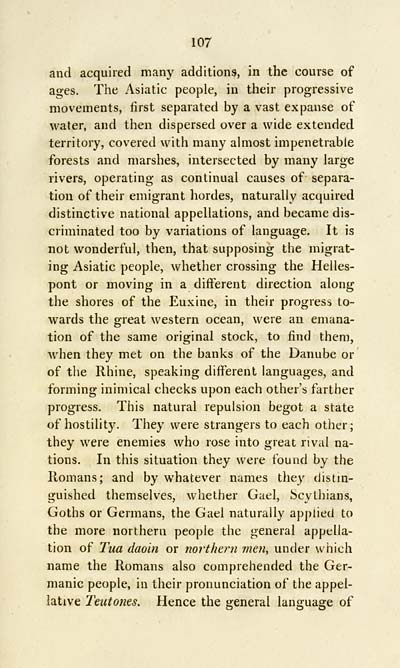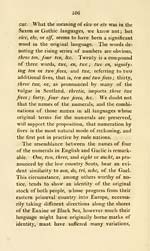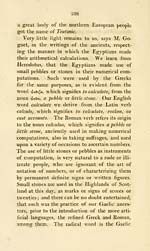Download files
Complete book:
Individual page:
Thumbnail gallery: Grid view | List view

107
and acquired many additions, in the course of
ages. The Asiatic people, in their progressive
movements, first separated by a vast expanse of
water, and then dispersed over a wide extended
territory, covered with many almost impenetrable
forests and marshes, intersected by many large
rivers, operating as continual causes of separa-
tion of their emigrant hordes, naturally acquired
distinctive national appellations, and became dis-
criminated too by variations of language. It is
not wonderful, then, that supposing the migrat-
ing Asiatic people, whether crossing the Helles-
pont or moving in a diiferent direction along
the shores of the Euxine, in their progress to-
wards the great western ocean, were an emana-
tion of the same original stock, to find them,
when they met on the banks of the Danube or
of the Rhine, speaking different languages, and
forming inimical checks upon each other's farther
progress. This natural repulsion begot a state
of hostility. They were strangers to each other;
they were enemies who rose into great rival na-
tions. In this situation they were found by the
Romans; and by whatever names they distm-
guished themselves, whether Gael, Scythians,
Goths or Germans, the Gael naturally applied to
the more northern people the general appella-
tion of Tua daoin or northern men, under which
name the Romans also comprehended the Ger-
manic people, in their pronunciation of the appel-
lative Teiitofies. Hence the general language of
and acquired many additions, in the course of
ages. The Asiatic people, in their progressive
movements, first separated by a vast expanse of
water, and then dispersed over a wide extended
territory, covered with many almost impenetrable
forests and marshes, intersected by many large
rivers, operating as continual causes of separa-
tion of their emigrant hordes, naturally acquired
distinctive national appellations, and became dis-
criminated too by variations of language. It is
not wonderful, then, that supposing the migrat-
ing Asiatic people, whether crossing the Helles-
pont or moving in a diiferent direction along
the shores of the Euxine, in their progress to-
wards the great western ocean, were an emana-
tion of the same original stock, to find them,
when they met on the banks of the Danube or
of the Rhine, speaking different languages, and
forming inimical checks upon each other's farther
progress. This natural repulsion begot a state
of hostility. They were strangers to each other;
they were enemies who rose into great rival na-
tions. In this situation they were found by the
Romans; and by whatever names they distm-
guished themselves, whether Gael, Scythians,
Goths or Germans, the Gael naturally applied to
the more northern people the general appella-
tion of Tua daoin or northern men, under which
name the Romans also comprehended the Ger-
manic people, in their pronunciation of the appel-
lative Teiitofies. Hence the general language of
Set display mode to: Large image | Transcription
Images and transcriptions on this page, including medium image downloads, may be used under the Creative Commons Attribution 4.0 International Licence unless otherwise stated. ![]()
| Early Gaelic Book Collections > Ossian Collection > Thoughts on the origin and descent of the Gael > (119) |
|---|
| Permanent URL | https://digital.nls.uk/82235872 |
|---|
| Description | Selected books from the Ossian Collection of 327 volumes, originally assembled by J. Norman Methven of Perth. Different editions and translations of James MacPherson's epic poem 'Ossian', some with a map of the 'Kingdom of Connor'. Also secondary material relating to Ossianic poetry and the Ossian controversy. |
|---|
| Description | Selected items from five 'Special and Named Printed Collections'. Includes books in Gaelic and other Celtic languages, works about the Gaels, their languages, literature, culture and history. |
|---|

